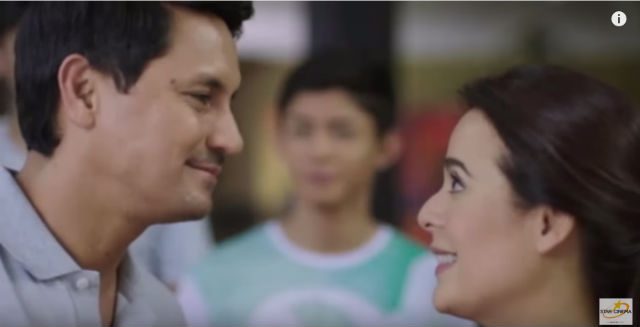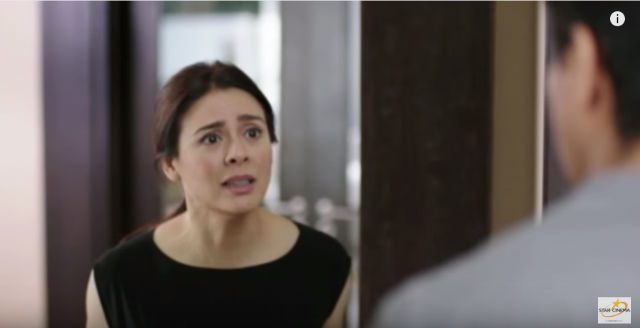SUMMARY
This is AI generated summarization, which may have errors. For context, always refer to the full article.

MANILA, Philippines – Vince (Richard Gomez), a successful neurosurgeon, arrives early at a party, only to discover that Trisha (Dawn Zulueta), his wife of close to 25 years, is cheating on him with his best friend. While trying on her wedding gown, Adie (Bea Alonzo), a young lawyer who is engaged to be married to her boyfriend of nearly a decade, sees a video of her fiancé having sex with a model. Vince and Adie, both perturbed by their respective partners’ infidelity, find comfort in one another.
That’s basically Nuel Naval’s The Love Affair, except that it is a lot more confused than what the simplistic synopsis would have you believe. The film is both stilted and stunted. It struggles to feign maturity without giving up on any of the melodramatic tropes and cliches that prevent it from being anything other than a purposeless pastime. It’s more likely to be callously forgotten than fondly remembered.
A nagging concern
The film is grossly overwritten and its characters are unnecessarily talkative. Its narrative is needlessly replete with dramatic confrontations that persist only to placate an unreasonable demand for quotable quotes. Unfortunately, a lot of those confrontations feel manufactured, bereft of any soul or real pain, despite all the tears and impassioned gestures that compose them.
The Love Affair is thirsty for silence. It begs for quieter moments where the aches and troubles it attempts to flesh out can take seed to resonate. Instead, Naval and screenwriter Vanessa Valdez drown the film with words and sentences. They have their characters spout exposition of both narrative and emotions, short-cutting their way to a very predictable resolution where blunt moralization trumps harsh realism.

To be fair, there are confrontations that are tense, but they are more products of artifice than authentic sentiment. For example, the word war between Trisha and Adie, while acted deliciously, is both emotionally and logically sterile. It is a scene that is there to arouse the scandal-hungry minds of viewers who have been kept longing for a scene where two women exchange hurtful words all in the name of the love of a single man.
In another confrontation, Adie is lectured by her best friend (Ina Feleo). Again, the scene is wonderfully acted, with both Alonzo and Feleo tearfully delivering their lines without any hint of hesitation. However, the scene itself is questionable because, first, the best friend has not been fully developed as a character to have that moral ascendancy over Adie to make the confrontation believable, and second, the scene feels more like an acting showcase than a pertinent part of the film.

Cause and effect
Of course, it isn’t the fault of the film’s cast. They do what they can, given that the characters they portray are all intolerably cruel naggers who are desperately draped by the filmmakers with spurious charm and acceptability.

Zulueta and Alonzo are not allowed the opportunity to explore characters with darker streaks of personality. They are all victims of being too much in love with a single man. Their motivation is romance, and nothing more. Gomez, on the other hand, struggles to depict the pained doctor with the right amount of sympathy. In the end, his character is more befuddled than embattled. There is simply too little to latch on with a trio of characters who mouth a lot about the urgency of being loved but are only empty shells undeserving of any emotions.
Naval and Valdez envision their characters as products of trauma. Their decisions are not fueled by their human imperfections but by sins of the past. The film feels like a medley of events that are lazily guided by the rule of cause and effect. Trisha cheats because Vince is a difficult husband. Vince cheats because Trisha cheated. Adie hates cheaters because her father is a cheater.

The logical connections provide no room for interpretation, for the characters to blame their fates not on the actions of others, but on their own frailty. This needless narrative conceit in turn makes the film sterile, a work that uses infidelity as a tool for escapism rather than as a springboard for discourse on marriage and divorce in the country.
If long-term relationships were capable of quick fixes by simple teary-eyed apologies like what the film tries to impart, then we might as well be living in a fantasy world. This is dangerous.
Cowardly as the rest
It is all the fault of a spineless system that favors films that mistake noise for emotions and follow a certain formula for the easiest but most unremarkable of results. Both the direction and the writing are results of a need to ape character complexity but all within the context of happy endings for characters wronged only by fate and not by their own doing.

The Love Affair is frustratingly cowardly. It teases with its put-on air of sophistication only to end up with a conclusion that is as juvenile as a Disney-fied fairy tale. It sorely belittles the gravity of marital woes and oversimplifies the mechanics of emotions and decision-making in supposedly permanent relationships. It’s all worrisome fluff. – Rappler.com
 Francis Joseph Cruz litigates for a living and writes about cinema for fun. The first Filipino movie he saw in the theaters was Carlo J. Caparas’ ‘Tirad Pass.’ Since then, he’s been on a mission to find better memories with Philippine cinema. Profile photo by Fatcat Studios
Francis Joseph Cruz litigates for a living and writes about cinema for fun. The first Filipino movie he saw in the theaters was Carlo J. Caparas’ ‘Tirad Pass.’ Since then, he’s been on a mission to find better memories with Philippine cinema. Profile photo by Fatcat Studios
Add a comment
How does this make you feel?
There are no comments yet. Add your comment to start the conversation.